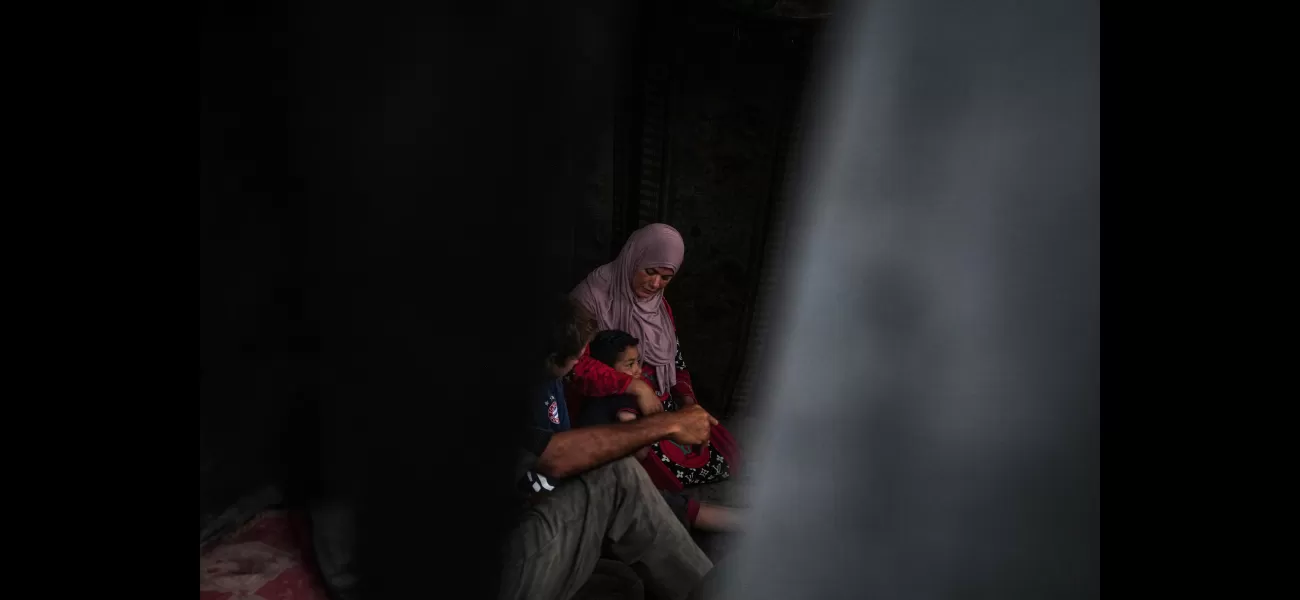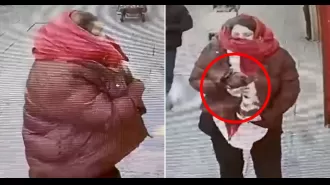Muslim holiday in Gaza, usually celebrated with joy, is a painful reminder of the toll of war for families.
Gaza Palestinians unable to celebrate Eid al-Adha properly this year due to ongoing war and will instead eat canned food in hot tents.
June 15th 2024.

In Deir al-Balah, Gaza Strip, the joyful atmosphere of Eid al-Adha has been replaced by devastation and despair. Last year, the Palestinians celebrated the important Muslim holiday with lavish feasts, new clothes for children, and sharing meat with those less fortunate. However, this year, after eight months of brutal conflict between Israel and Hamas, the people are left with nothing but war, hunger, and misery.
Nadia Hamouda, who lost her daughter in the war and was forced to flee her home, now lives in a stifling tent in the central town of Deir al-Balah. She mournfully states that there is no Eid this year, only tears for their losses and the life they once had. The call to prayer, which used to bring joy and celebration, now serves as a reminder of their suffering.
Eid al-Adha, also known as the Feast of the Sacrifice, is a four-day celebration that commemorates the story of Prophet Ibrahim's willingness to sacrifice his son as a testament of his faith. While the story is shared by Muslims, Jews, and Christians, the recent events in Gaza have made it difficult for the Palestinians to celebrate in the traditional manner.
Despite the poverty and isolation in Gaza, the people always found a way to celebrate Eid with colorful decorations, treats for children, and sharing meat with those in need. Hamouda fondly remembers the joy and happiness of previous Eids, but now the situation is different. The war has left Gaza in ruins, with most of the population forced to flee their homes.
The war has taken a toll on the people, with over 37,000 Palestinians killed and most of Gaza's agriculture and food production destroyed. The ongoing fighting and Israeli restrictions have also hindered humanitarian aid from reaching the people. United Nations agencies warn that over a million people, almost half of the population, could experience starvation in the coming weeks.
To make matters worse, the only route for people to enter or leave the territory, the Rafah crossing into Egypt, has been shut down. This means that many Palestinians will not be able to make the annual Hajj pilgrimage, which usually precedes Eid. Ashraf Sahwiel, a displaced Palestinian, has no idea when he will be able to return to his home and does not even know if it's still standing.
The war has also resulted in severe shortages of livestock and feed, causing a sharp increase in prices. This has made it impossible for many families to afford meat, a traditional part of the Eid celebrations. Abdelsattar al-Batsh, a father of seven, reveals that his family has not eaten meat since the conflict began. A kilogram of meat now costs 200 shekels, and a live sheep, which used to cost $200, now costs $1,300, if it's even available.
Abdelsattar al-Batsh used to work in the local meat industry, which saw a boom in business during the holiday season. However, this year, he, like many others, can only afford rice and beans. He longs to work again and provide for his family, but with the current situation, it seems like a distant dream.
The people of Gaza are resilient, but the war has pushed them to their limits. Many have been forced to take refuge in shelters, including cattle farms that have been turned into makeshift homes. The living conditions are far from ideal, but some, like Mohammed Abdel Rahim, try to make the best of it. He shares that the shelter was unbearable during the winter, but as the heat sets in, it becomes more bearable.
As the rest of the world prepares to celebrate Eid al-Adha, the people of Gaza have nothing but war, hunger, and misery. Their once vibrant and lively celebrations have been replaced by devastation and despair. Khaled, reporting from Cairo, captures the heartbreaking reality of the Palestinians in Gaza, who long for the simple joys of Eid that are now out of reach.
Nadia Hamouda, who lost her daughter in the war and was forced to flee her home, now lives in a stifling tent in the central town of Deir al-Balah. She mournfully states that there is no Eid this year, only tears for their losses and the life they once had. The call to prayer, which used to bring joy and celebration, now serves as a reminder of their suffering.
Eid al-Adha, also known as the Feast of the Sacrifice, is a four-day celebration that commemorates the story of Prophet Ibrahim's willingness to sacrifice his son as a testament of his faith. While the story is shared by Muslims, Jews, and Christians, the recent events in Gaza have made it difficult for the Palestinians to celebrate in the traditional manner.
Despite the poverty and isolation in Gaza, the people always found a way to celebrate Eid with colorful decorations, treats for children, and sharing meat with those in need. Hamouda fondly remembers the joy and happiness of previous Eids, but now the situation is different. The war has left Gaza in ruins, with most of the population forced to flee their homes.
The war has taken a toll on the people, with over 37,000 Palestinians killed and most of Gaza's agriculture and food production destroyed. The ongoing fighting and Israeli restrictions have also hindered humanitarian aid from reaching the people. United Nations agencies warn that over a million people, almost half of the population, could experience starvation in the coming weeks.
To make matters worse, the only route for people to enter or leave the territory, the Rafah crossing into Egypt, has been shut down. This means that many Palestinians will not be able to make the annual Hajj pilgrimage, which usually precedes Eid. Ashraf Sahwiel, a displaced Palestinian, has no idea when he will be able to return to his home and does not even know if it's still standing.
The war has also resulted in severe shortages of livestock and feed, causing a sharp increase in prices. This has made it impossible for many families to afford meat, a traditional part of the Eid celebrations. Abdelsattar al-Batsh, a father of seven, reveals that his family has not eaten meat since the conflict began. A kilogram of meat now costs 200 shekels, and a live sheep, which used to cost $200, now costs $1,300, if it's even available.
Abdelsattar al-Batsh used to work in the local meat industry, which saw a boom in business during the holiday season. However, this year, he, like many others, can only afford rice and beans. He longs to work again and provide for his family, but with the current situation, it seems like a distant dream.
The people of Gaza are resilient, but the war has pushed them to their limits. Many have been forced to take refuge in shelters, including cattle farms that have been turned into makeshift homes. The living conditions are far from ideal, but some, like Mohammed Abdel Rahim, try to make the best of it. He shares that the shelter was unbearable during the winter, but as the heat sets in, it becomes more bearable.
As the rest of the world prepares to celebrate Eid al-Adha, the people of Gaza have nothing but war, hunger, and misery. Their once vibrant and lively celebrations have been replaced by devastation and despair. Khaled, reporting from Cairo, captures the heartbreaking reality of the Palestinians in Gaza, who long for the simple joys of Eid that are now out of reach.
[This article has been trending online recently and has been generated with AI. Your feed is customized.]
[Generative AI is experimental.]
0
0
Submit Comment





